In the intricate dance of human connection, where emotions ebb and flow like the tides, forgiveness often emerges as a pivotal partner. But is it always the secret ingredient for relationship success, or merely one path among many? As we navigate the delicate balance between holding on and letting go, this article delves into the nuanced role of forgiveness in our relationships. Through stories, insights, and expert perspectives, we explore whether forgiveness is a universal necessity or a choice that depends on the unique choreography of each relationship. Join us as we unravel the complexities of forgiveness and its impact on the ties that bind us.
Understanding Forgiveness: The Foundation of Emotional Healing
Forgiveness is a powerful tool that can pave the way for emotional healing, but it isn’t always straightforward. At its core, forgiveness involves letting go of resentment and the desire for retribution. This process can be incredibly liberating, offering individuals a chance to release emotional burdens and move forward. However, it’s essential to recognize that forgiveness doesn’t mean excusing harmful behavior or forgetting past transgressions. Instead, it’s about freeing oneself from the emotional shackles of past hurt.
- Empowerment: By forgiving, individuals often find a sense of empowerment, reclaiming control over their emotional state.
- Inner Peace: Letting go of grudges can lead to a profound sense of peace and clarity.
- Relationship Growth: While forgiveness can be crucial for healing, it doesn’t automatically ensure relationship success. It must be accompanied by genuine change and understanding from both parties.
Ultimately, forgiveness is deeply personal and may not be necessary or appropriate in every situation. Each relationship is unique, and the decision to forgive should be guided by one’s own emotional needs and boundaries.

The Role of Forgiveness in Building Trust and Resilience
In the intricate dance of relationships, forgiveness often emerges as a cornerstone for rebuilding trust and fostering resilience. When individuals choose to forgive, they open a pathway for healing and understanding, creating a space where vulnerability can be met with empathy. This act of letting go can transform perceived weaknesses into strengths, allowing partners to navigate the complexities of human imperfection. As trust is slowly restored, relationships can emerge stronger, having weathered the storms of disappointment and misunderstanding.
Consider the following ways forgiveness contributes to relationship dynamics:
- Emotional Release: Letting go of grudges can alleviate emotional burdens, leading to a healthier mental state for both parties.
- Improved Communication: Forgiveness encourages open dialogue, paving the way for honest discussions about feelings and expectations.
- Increased Empathy: Understanding each other’s perspectives fosters compassion, allowing for deeper connections.
While forgiveness is powerful, it is not a one-size-fits-all solution. It requires genuine reflection and the willingness to rebuild trust, ensuring that the foundation of the relationship remains strong and resilient.

When Forgiveness Isn’t the Answer: Exploring Alternatives
While forgiveness is often seen as a cornerstone of healing, there are situations where it might not be the best path forward. In cases of repeated betrayal or harmful behavior, alternatives to forgiveness can offer a more empowering route. Establishing boundaries is a crucial step, allowing individuals to protect their emotional well-being and set clear expectations for future interactions. Instead of focusing on forgiving the other party, one might choose to focus on self-care and personal growth.
Exploring alternatives can include:
- Open Communication: Engaging in honest dialogue to address issues without necessarily forgiving.
- Therapy or Counseling: Seeking professional guidance to navigate complex emotions.
- Self-Reflection: Understanding personal needs and desires to move forward.
- Mindfulness Practices: Techniques like meditation to cultivate inner peace and clarity.
These strategies can foster relationship success by promoting healthier interactions and personal empowerment, even when forgiveness isn’t part of the equation.

Practical Steps to Foster Forgiveness and Reconciliation
Forgiveness and reconciliation are intricate processes, often requiring intentional actions and emotional resilience. To embark on this journey, start by acknowledging your emotions without judgment. This self-awareness is crucial in understanding the depth of hurt and setting the groundwork for healing.
- Communicate Openly: Engage in honest conversations where both parties can express their feelings. Use ”I” statements to avoid blame and foster understanding.
- Empathy Exercise: Try to view the situation from the other person’s perspective. This doesn’t mean justifying their actions but recognizing their humanity.
- Set Boundaries: Define what is acceptable moving forward. This creates a safe space for both individuals and helps prevent future conflicts.
- Seek Mediation: If direct communication is challenging, consider involving a neutral third party to facilitate the dialogue.
Implementing these steps with patience and consistency can pave the way for genuine reconciliation. Remember, forgiveness is a personal choice, and while it can enhance relationship success, it must align with your emotional readiness and personal values.




